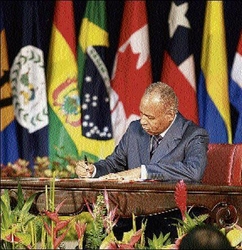An old saying asks one never to go where one gets too much respect. This is because getting too much attention is a sure recipe for developing a temperament accustomed to throwing tantrums at the slightest perceived disrespect. Therefore, one should never cultivate the habit of receiving too much respect or honor. Not following this precept once led to a very unfortunate sequence of events, and finally it took the might of Lord Vishnu and Shiva to set things on their right course.
It so transpired that in a gathering of distinguished personalities, including Lord Shiva, Daksha, Shiva's father in law, made a splendorous entry shining brilliantly like a second sun. The assembly immediately rose to its feet, all except his son in law.
Now, Daksha was a great king of kings, much used to getting honor and respect wherever he went. To him, Shiva's not getting up to welcome him was an extreme insult, and he was unable to digest it. He looked at Shiva sideways with wrath and addressed the gathering:
"Listen to me, O' distinguished people. I wish to speak to you of the behavior of civilized persons and whatever I speak is not out of jealousy or ignorance. This Shiva is shameless, and is ruining the reputation of this distinguished gathering. By marrying my virtuous daughter, he is in a sense equivalent to my son; therefore, it would have been but basic courtesy on his part to get up and welcome me. However, he lacks even that, and did not bother to utter at least some words of respect when I entered. It was with reluctance and only on the advice of Lord Brahma that I gave away my delicate young daughter to him in marriage. He lives surrounded with ghosts and spirits. He bathes his body with ashes from funeral grounds and wanders around naked with his hair scattered like one possessed, sometimes laughs and sometimes cries. He wears a necklace of human heads and ornaments his body with bones. He is but Shiva (pure) in name only, actually he is Ashiva (impure)."
Thus did Daksha sputter venom. However, throughout this diatribe, Lord Shiva sat unperturbed, without retaliating. This enraged Daksha even more and he got up to curse Shiva: "From now on, in sacrifices (yajna), this Shiva will not receive a share of the sacrificial offerings." Then in a great rage he left the place and retired to his home.
Hearing of the curse, Nandi, the vehicle of Shiva, too uttered a curse on Daksha in return saying: "Only those obsessed with the physical body would dare to find fault with Lord Shiva, the embodiment of detachment (Vairagya). May that Daksha, who cherishes such a viewpoint, be always occupied with his physical existence only and be far removed from the path of spiritual upliftment. He is continually engaged in gratifying sensual pleasures and is therefore much attached to the householder's life which is full of pseudo-religious practices. He thinks of the body as his soul, and is therefore as good as a beast. He will therefore become intensely addicted to women and have the head of a goat. Enemies of Lord Shiva like Daksha shall always be infatuated with karma and remain entangled in the cycle of death and rebirth. The Brahmins who endorsed his cursing of Lord Shiva shall leave aside the scriptural injunctions regarding what is eatable and what is not and will devote themselves to learning (vidya), penances (tapas), vows (vratas) only for the sake of earning their livelihood. They will delight only in the pleasures of the body, and wander about begging in the world."
On hearing this curse, a bearded sage from the side of Daksha named Bhrigu too cursed the followers of Shiva in return: "Those who are the followers of Shiva will act contrary to the scriptures. They shall be devoid of purity and good conduct, and anointing themselves with ashes will be initiated into the tradition of Shiva, where wine will be granted a divine status."
This cursing and counter-cursing made Lord Shiva disconsolate and he left the gathering.
A long time after this episode, Sati Devi, the wife of Shiva, observed numerous airplanes carrying heavily ornamented beautiful women along with their spouses. Evidently they were all going to attend some festivities. On enquiry it was revealed that her father Daksha had organized a huge Yajna (Vedic sacrifice), and all were invitees going there. Much excited on hearing of the festivities going on at her father's house, she turned to address Shiva:
"My Lord, I have heard that your father in law King Daksha has organized a big round of sacrificial festivities at his house. See, all the gods are going there. If you wish, we too can go there. My other sisters will definitely be going there along with their husbands. I too wish to receive the gifts offered by my parents. I am eager to see my mother and aunts gathered there. In addition, we will also able to witness the great Vedic sacrifice conducted by great sages. My dear Lord, you are beyond the vagaries of Nature and hence have no desire to go or meet anyone. However, I am but a poor woman, unaware of these spiritual niceties. I therefore long to see my birthplace. Look at these other women richly adorned and going with their husbands in droves, with their white swan-like airplanes beautifying the skyline."
"Dear Lord, which daughter can remain unmoved on hearing of a festival in her father's house? Remember, the scriptures say that one can go uninvited to the houses of their friends, husbands, gurus and parents. Therefore, O' Great Compassionate One, you, who have given me space in half portion of your body, do grant me this desire."
Thus earnestly entreated by his beloved wife, Shiva was painfully reminded of the bitter words of his father in law; however, he replied to her with a smile: "O' charming lady, you are right when you say that one can go to one's loved one's even uninvited. However, this is the case only when their viewpoint is not clouded by their powerful ego. Learning, wealth, beauty, high birth etc are exalted qualities in the case of the good, but for the wicked, they are the means of degradation, since they get puffed up with pride and are therefore unable to appreciate the glory of the great. Thinking them to be their 'relatives,' one should never go the houses of those who look upon the visitor with a frown and angry looks."
"O'Devi, the arrows of an enemy do not wound one as much as the harsh words of one's crooked relatives because in the former case at least one can find rest in sleep, but the latter suffers day and night with a tormented heart. I know that you are the favorite of your father, even then dear one, you will not get proper attention at your father's house because he is envious and harbors a grudge against me."
"O' lady with a slender waist, you may wonder why I did not honor Daksha in that ill-fated assembly? The answer is that those established in the Absolute Truth pay obeisance only to the Supreme Person Vaasudeva enshrined in the heart of all. A pure heart is called Vasudev (father of Krishna), in it is made manifest Vaasudeva (Krishna). Hence, it is to that Absolute Person, who unveils himself in pure hearts do I perform my Namaste. Therefore my beloved, he who abused me even though I was not at fault, even though he is the one who has given birth to your body, you should not consider seeing him because he breeds enmity towards me. If you go there ignoring my advice, it won't bide good for you because when a reputable individual suffers insult from his or her relatives, that indignity becomes the immediate cause of their death."
Having said this much Lord Shiva became silent. He realized that whether Devi Sati goes or not, in both cases there was a chance of her giving up her life. Meanwhile Sati, intensely eager to meet her relatives, sometimes went outside the door, and sometimes returned fearing Shiva would get upset. Thus oscillating like a pendulum and undecided she burst out into copious tears and with her body trembling looked askance at Shiva as if to burn him down. Then she lost her judgment and becoming captive of her essentially feminine nature, did the unthinkable. She defied him, who out of affection had given half of his body to her, and taking long breaths set out towards her parents house.
Seeing her go alone, several of Shiva's followers set out to accompany her. It was not long before the entourage reached her father's residence, which at that time was reverberating with sacred Vedic Chants. Contrary to her expectations, she was treated with indifference by Daksha. Only her mother and sisters welcomed her openly and embraced her. The rest of the assembly, afraid of upsetting Daksha, made no signs of welcoming her.
Devi Sati, not at all welcomed by her father, did not accept the seat of honor respectfully offered to her by her mother and maternal aunts. Nor did she pay attention to her sister's affectionate enquiries about her health etc. Not only that, she observed that in that sacrifice, even though seats had been reserved for the gods, there was none reserved for her husband, the Great Lord Shiva. This greatly agitated Sati and it seemed that she would destroy the world with the fire of her anger. Shiva's followers forming her entourage too observed the dishonor meted out to their master and were about to kill Daksha when they were restrained by Sati. With all the assembled gathering hearing her words, she censured Daksha, her voice faltering with the intensity of her anger:
"Father, who else but you would behave inimically towards Lord Shiva, who is above enmity? There is nobody superior to Lord Shiva in the world. He is the beloved soul of all beings, he neither favors nor disfavors anyone. Hence, he has no differences with anyone. Jealous people like you discover faults in the virtues of others. Great people not only do not see any defect, they view the minutest merit in others with a large magnifying glass. You are indeed inauspicious because you hate the supremely auspicious Shiva, whose very name, uttered incidentally by the tongue even once, destroys all sins. The bee-like hearts of eminent sages hover around his lotus feet ever eager to taste the bliss of Brahmananda (bliss of being absorbed in divinity)."
"You say that Shiva is Ashiva. Perhaps the other gods do not know this because they feel honored in adorning their heads with flowers fallen from the same Shiva who dwells in the cremation grounds and beautifies himself with ashes and skulls lying there. When unrestrained people criticize the Supreme Lord Shiva, protector of Dharma, one should shut one's ears and leave the place. Or if one has the power he should cut off the tongue of the person, and if the need arise one should even lay down one's life if necessary to prevent such slander."
"Therefore, I will not retain this body which is born of you, because wise people say that the remedy for eating impure food is to vomit it out. Vedic injunctions do not apply to those who revel in the Supreme Self enshrined in all. The Vedas prescribe two paths -
1). Pravritti Dharma: The path of karma,
2). Nivritti Dharma: The path of renunciation.
These two cannot be simultaneously followed by the same person. However, Shiva, being the Supreme God, does not need to follow any of these two paths. Father, our affluence is unmanifest, to be enjoyed only by Avadhutas (those who have renounced everything). People like you, following the path of smoke (generated by the sacrificial fires) can never appreciate this absolute wealth. I feel ashamed of my unworthy father. It is a disgrace to be born from a parent who commits an offence against the great. When in a light mood Lord Shiva will call out to me "O' daughter of Daksha", then, forgetting the light-heartedness behind it, I will become extremely pained. Therefore, I shall give up this corpse-like body begotten from you."
Having vented her feelings thus, Devi Sati, wearing a yellow garment, sat down on the ground with her face to the north. She closed her eyes and entered the yogic path for casting off her material body. Concentrating on the lotus feet of her beloved Lord Shiva, she became completely absorbed and lost track of everything else. The intense heat of her yogic powers then set ablaze her body, the same body, which at many times, Shiva had lovingly placed in his lap.
Immediately there arose in the gathering an enormous uproar of grief: "Alas, provoked by her father, Sati the beloved wife of Shiva has given away her life. Look at the enormous wickedness of Daksha, his pure-hearted daughter who ever deserved honor, had to give up her life due to the insults inflicted by him. This intolerant Daksha will reap great infamy in this world. He did not even care to prevent his daughter while she was preparing to end her life."
While the people were thus lamenting, Shiva's attendants who had accompanied Sati, on seeing her miraculous self-immolation, rose with weapons in their hands to kill Daksha. Seeing their aggressive vehemence, Bhrigu, from Daksha's side, created out of the sacrificial fire numerous divine beings who rushed out and drove back the followers of Shiva.
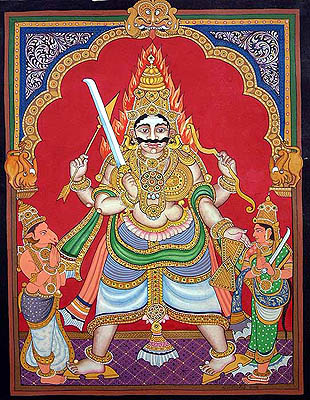
Virabhadra, Shiva's Most Trusted Guard |
Soon Shiva learnt of his wife's humiliation and subsequent death. Enraged, he plucked a hair from his matted locks and with a loud laughter dashed it on the ground. Immediately there arose a being of colossal size, touching the skies by his stature. He had sharp fangs and his locks of hair were red like dazzling flames. He was holding aloft various weapons. Shiva then ordered this manifestation of his wrath named Virbhadra, to go and destroy both Daksha and his sacrifice.
When the thundering approach of Virbahdra was heard in Daksha's sacrificial ground, the women there murmured amongst themselves: "Surely this is the consequence of the sin committed by Daksha, when he slighted his innocent daughter Sati and also offended Lord Shiva. What good can ensue for someone who enrages Lord Shiva?"
Much perturbed and fearful, the assembly in Daksha's sacrifice sat speculating and looking at each other. In the meanwhile Virbhadra, along with other followers of Shiva, reached the venue and immediately set about destroying the Yajna. Some broke the pillars supporting the whole structure, some the sacrificial utensils, and some destroyed the kitchen and storeroom. Many sacrificial fires were put out and supporters of Daksha were threatened. Virabhadra himself caught hold of Daksha and seating himself on his chest tried to cut off his head with a sharp sword. However, even after a lot of effort he was unable to behead him. Much surprised, Virbhadra then proceeded to cut the head of Daksha in the same manner that the latter used to sacrifice animals in his yajnas. As soon as he succeeded, there arose a cry of "well done" "bravo" from amongst the followers of Shiva. Virabhadra then threw Daksha's head into fire and proceeded to burn down the whole structure. Having accomplished what he had been ordered to do, he then returned to Lord Shiva's abode, Mount Kailash.
The assembled gods, sages and priests were overwhelmed with fear on thus being defeated by the accomplices of Shiva. They collected together and hurried over to Lord Brahma, requesting his help. Brahma and Lord Vishnu both knew that the Yajna was doomed from the beginning because it had not reserved a place of honor for Lord Shiva. Hence, they had prudently taken the precaution of not attending it. Now hearing all what had happened, Brahma replied to them:
"All of you have committed an offence against Lord Shiva by excluding him from the sacrificial offerings. Now with pure hearts go and take refuge in his lotus feet, because he is one who gets propitiated very easily. You should immediately beg his pardon, much bereaved as he is with the loss of his wife's life. Otherwise, his rage is bound to destroy the world."
However the gods and sages were still fearful of facing Shiva by themselves. Therefore, Brahma took the initiative and went along with them to Shiva's abode. There they saw Shiva seated with his left foot on his right lap, and his left hand on the left knee. A rosary of Rudraksh was on wrapped around wrist. He was discoursing on the Supreme Absolute Truth, and many saints were listening to him in rapt attention.
Seeing Brahma Ji, Lord Shiva immediately sprung to his feet and bowed to him with respect. The host of saints around Shiva also did the same. Brahma then smilingly addressed Lord Shiva:
"I know you are the Lord of the Universe (even then you pay homage to me). You yourself have created the institution of Yajna for the protection of Vedic Dharma. Anger cannot overwhelm those who surrender to your lotus feet (then how can it affect you?). Exalted ones like you do not kill even those wicked one who constantly burn with jealousy at the prosperity of others and are naturally disposed to hurt others feelings, knowing very well that they doomed by providence itself. If someone, deluded by Lord Vishnu's powerful Maya, offends the great, righteous ones like you consider the offence an act of providence and do not try to stop whatever is trying to happen."
"You are untouched by Maya, you should therefore show grace on those who, affected by maya, are attached to karma. O' Lord, please revive the sacrifice of Daksha, which remained incomplete due to the petty mindedness of those performing it. May Daksha come to live again and may also all those dismembered by your followers be restored to health. O' Shiva, whatever shall remain after the completion of a Yajna from now on will be your share. O' destroyer of sacrifice, let this Yajna now be completed."
Lord Shiva heard out Brahma patiently and then replied smiling: "I do not pay attention nor think about the offences committed by people like Daksha, who are under the spell of Lord's Maya. I only chastise them slightly (much less than what their conduct deserves) as a punishment. The head of Daksha has been burnt; he may now live with the face of a goat. All the rest of the priests, sages etc, too may be restored to health."
Hearing Shiva's soothing words, all present there were satisfied and shouted out in unison: "Glory to Lord Shiva." Then they cordially invited Shiva to accompany them to the venue of the sacrifice, to which he complied. They followed Shiva's instruction to the letter and joined the head of the sacrificial goat to Daksha's trunk. While the head was being joined, Shiva cast a gracious look at it, and lo! Daksha got up though from sleep and saw Shiva in front of him. He was however not the same Daksha of before. Shiva's compassionate glance on him had purified him, and the same heart which once harbored intense hatred against Shiva, was now restored to its pristine purity like a pool in autumn. He tried to address Shiva but, remembering his deceased daughter, he was overwhelmed with emotion and affection. However, he controlled himself and with a choked throat said:
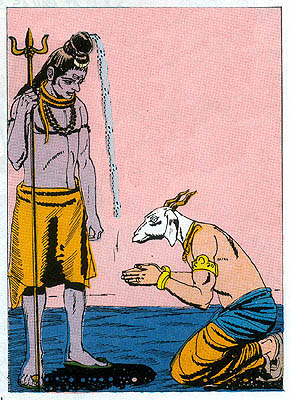
Dakhsa pays homage to Shiva |
"O' Venerable Lord, Even though I disrespected you, you showed a great favor by meting out a corrective punishment to me. I did not know your essence and hence pierced you with my sharp words in the assembly. However, you compassionate one did not pay heed to my mistake. Due to my offence, I was destined to fall down into dark hells, but you saved me with your compassionate glance."
Having thus apologized to Lord Shiva, Daksha then set out to restore the sacrifice, with the help of the priests and sages. No sooner had Daksha taken up the oblation in his hand than there appeared before him the Supreme Lord Vishnu himself. All present there bowed to him with folded hands.
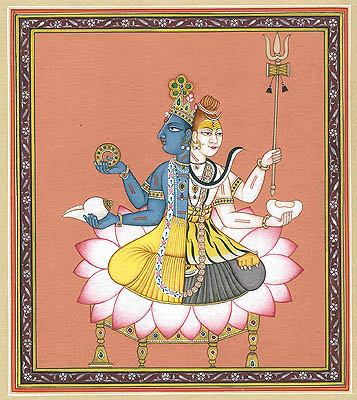
Hari-Hara (A Composite Image Vishnu and Shiva) |
Lord Vishnu said: "I, Brahma and Shiva are one and the same. It is only the ignorant who view Brahma and Shiva as different from me. We three are essentially one, and only that individual, who sees no difference between us, can get real peace."
Conclusion:
The word 'daksha' in Sanskrit means 'efficient in performing karma'. It points to the materialistic, logical mode of thinking, which is the way most of us lead our lives. Shiva represents faith, and Sati denotes our intellect (buddhi). When the buddhi leaves faith and joins logic, it is but self-immolation. The scriptures clearly state that in case of a dispute between husband and father, a woman's duty is to side with her husband. Thus in a dispute between logic and faith, it is to the latter that we must cling to. It is but the natural state of our intellect. In the case of Sati too, we observe that while she was at her husband's place, it was affection for her father that was dominating; and at her father's house, affection for her husband came to the fore. Actually, attachment to Shiva (faith) was all the while lying dormant inside her and it only needed a spark to manifest forth. However much the buddhi tries to cling to its logical moorings, it will find rest only on the shore of absolute faith.
Well-dressed gentlemen addicted to the material life of the householder do not have any attachment for semi-clad saints. Winston Churchill never met Gandhi, calling him a 'half-naked fakir.' However, the company of these very saints is said to unshackle the bonds of worldly life:
'While attachment to worldly objects is the mighty chain fettering down the soul to samsara, this same very attachment, when transferred to saints, is the open door to liberation.' (Shrimad Bhagavatam 3.25.20)
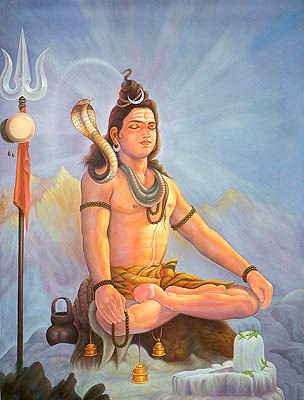
Kailashpati on Kailash (Meditating Shiva) with Shivalinga of Ice |
The way of the saints is beyond the comprehension of the worldly. They do bhakti wherever they are seated, not requiring specially marked places (temples etc) like we do. Shiva, who is always in a state of constant samadhi, was doing so in that gathering too. When Daksha entered the assembly hall, at that moment too Shiva was seated with his eyes closed in inward trance. What is there to see in this world for exalted ones like Lord Shiva?
Daksha chastises Shiva for living in the cremation grounds. The whole world is a cremation ground. Kashi itself is a big cremation ground for all to see. Even the house is a cremation ground. This suggests that Shiva, the Supreme God, lives everywhere. He reviles Shiva for being the god of spirits and ghosts. If Shiva were not there to accept such fallen souls, who could they look upto for spiritual upliftment? Lord Vishnu accepts only the highest quality Vaishnavas, much purified by penances, conduct etc. What about impure creatures, who is going to look after them? It is the magnanimous Shiva who does this job. Shiva does not seem to follow the established code of conduct. Why should he? He is beyond the shackles of Maya, and therefore beyond the injunctions of the Vedas.
The Bhagavatam clearly says:
'Shiva has no relative or non-relative in this world. Nobody is specially respectable or condemnable to him. There is none equal or superior to him. He is the ultimate goal of saintly people, yet chooses for himself a ghastly way of life. This is because he wishes to remind us that this body is but destined to be food for dogs. Those unfortunate people who delight in decorating it with fine garments, ornaments, garlands etc, don't understand Shiva, who is ever absorbed in self-bliss.' (3.14.25-27)
One thing definitely is for sure; no progress is possible for those who criticize Lord Shiva or those, who like Daksha, give no part of their worship to him.
References and Further Reading
- Dogre, Shri Ramachandra Keshav. Shrimad Bhagavat Rahasya (Collection of Discourses): Delhi.
- Saraswati, Swami Akhandananda Bhagawatamrit (The Elixir of the Bhagwat) Mumbai, 2005.
- Saraswati, Swami Akhandananda. Bhagavata Darshan (Collection of Discourses in Two Volumes): Mumbai, 2003.
- Saraswati, Swami Akhandananda (tr). Shrimad Bhagavata Purana (2 Volumes): Gorakhpur, 2004.
- Swami, Shridhar. Commentary on the Shrimad Bhagavatam: Delhi, 2003.
- Tagare, G.V. (tr). The Bhagavata Purana (5 Volumes (Annotated)) Delhi, 2002.
- Tejomayananda, Swami. Shrimad Bhagavata Pravachan (Discourses on The Shrimad Bhagavata Purana): Mumbai, 2006.


